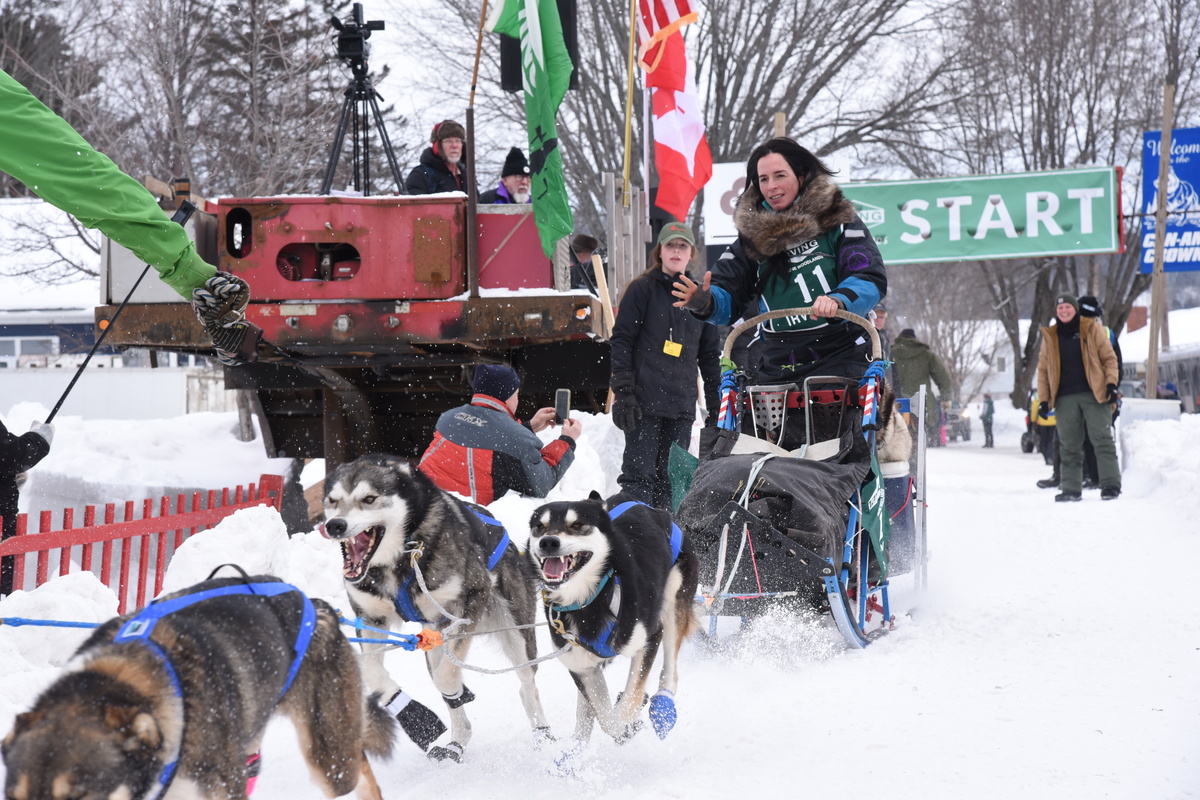FORT KENT, Maine — Organizers of the Can-Am Crown International Sled Dog Race are hopeful that the worst is behind them as they prepare for the 2025 event in March.
Unseasonably warm weather last winter forced them to cancel the 2024 races, much to the disappointment of the 64 mushers from around the country and Canada who had signed up, not to mention the Fort Kent-area businesses that are supported by racers and fans.
Then, in May, organizers were confronted with new regulations for bringing dogs into America imposed by the U.S. Centers for Disease Control and Prevention. The new rules were written to prevent the spread of canine rabies.
As first proposed, the CDC rules would have required all dogs crossing the border to be at least six months old and to appear healthy, be microchipped, receive a new rabies vaccination, and a certificate indicating that they’re coming from a low-risk or rabies free country.
The good news for Can-Am participants and the Fort Kent community is the CDC is reconsidering some of the regulations.
As for the weather, well, race organizers and members of the community are doing a lot of praying for snow and cold.
“They just can’t wait,” said Can-Am Vice President Sarah Brooks. “Unfortunately, like everybody else, we all want snow, and we’re all doing snow dances. We’re doing snow dances daily.”
This year’s difficulties have not deterred mushers from signing up for the 2025 event.
According to the Can-Am website, 26 mushers are signed up for the 30-mile race, 16 are signed up for the 100-mile race, and 13 are signed up for the 250-mile race, which is an Iditarod-qualifier.
Brooks said that they expect to see about 15 to 18 mushers altogether in the 250-mile category by race time.
Mushers are traveling from as far as Minnesota, New Hampshire, Quebec, New Brunswick, and Iowa for the 250-mile race.
She credited race organizers and participants for working diligently to get the CDC regulations reconsidered.
Can-Am organizers spoke out against these rules, which they said would create significant financial and logistical burdens for mushers coming from Canada.
Brooks said they put the word out and received hundreds of letters from people across the U.S. and Canada who were concerned about the rules. They sent those letters to people connected to U.S. Senators Susan Collins and Angus King, and U.S. Congressman Jared Golden.
A total of 14 U.S. senators urged the CDC to stop these rules, and Golden introduced a bipartisan amendment to block federal funding from being used to enforce the CDC’s dog importation rules.
In a letter sent to the CDC with the support of the American Kennel Club, one of the country’s leading groups asking for delayed implementation of the new regulations, Collins specifically cited the rule’s impact on the Fort Kent race.
“The final rule will also affect participation in the Can-Am Crown International Sled Dog Race, since the majority of participants are Canadian,” Collins wrote to the CDC in July. “Can-Am is the longest and highest caliber dog sled race in the eastern United States. The race attracts hundreds of participants, sponsors, and spectators to northern Maine each March and is a major contributor to the St. John Valley region’s economy.”
In July, the CDC simplified the new rules to reduce the amount of forms required.
As originally presented, adherence to these rules would have cost roughly $150 to $300 per dog. For someone with a full team of dogs, it could have cost thousands to travel to the Can-Am.
Earlier this month, the CDC acknowledged that it made a mistake by not adequately considering the concerns of dog owners and residents of border communities. The CDC will reopen the rulemaking process and will delay implementing some of the regulations until April 1 of next year, according to a press release from Collins’ office.
Brooks said they are cautiously optimistic about this announcement, and that it is a step in the right direction.
Some rules will remain in place, such as the requirement for dogs to be at least six months old and microchipped.
If someone in Maine wants to develop a sled dog team, Brooks said the six-month requirement makes it difficult to find a puppy in Canada to bring over and raise in the U.S.
“If you have to wait until the puppy is 6 months old,” she said, “you’ve lost a lot of bonding time with that puppy.”
She added that most breeders do not keep puppies for six months, and also that most veterinarians are unlikely to vaccinate a puppy under 6 months old for rabies.
As the CDC revisits these rules, they will hold public input sessions. Brooks said that no major stakeholder organizations, such as the American Kennel Club, were aware of these sessions the first time around.
And with the rules being rewritten, Brooks said there is now an opportunity for stakeholders to speak about how these rules will affect them during upcoming public comment periods.
Any new revisions that come out of these new sessions, however, would not take place until after the next Can-Am event, which is set for March 1, 2025. But any dogs entering from Canada will still need to be over six months old, microchipped and healthy.
Regulations aside, Fort Kent Town Manager Suzie Paradis also said that many in the community are optimistic that the event will be a success.
“Right now everyone’s praying for snow, and we’re all trying to be optimistic,” Paradis said. “I think everything is going to work out to our benefit.”
The Can-Am is a major economic driver to the region. Last year’s cancellation dealt a significant blow to the community, as hotels and restaurants often depend on the business brought in by mushers, volunteers, and spectators.
And while some events in the region, such as the Acadian Pond Hockey Classic, have moved their dates earlier in the year to ensure that there will be appropriate winter weather, Can-Am organizers are unable to move the date of their event.
Brooks said there is a series of sled dog events that all take place around the same time, and each race in the circuit is spaced about two weeks apart to give the mushers and dogs a chance to rest and recover, and the Can-Am’s place within that circuit cannot be moved.
Brooks is also the checkpoint coordinator for the 250-mile race in Portage. At that checkpoint alone, she said there are about 80 volunteers working on the trails and tending to mushers and their dogs.
Altogether, she said there are about 400 volunteers involved in the Can-Am. Many of them, she said, are traveling about 300 miles up from areas like Harpswell. They begin clearing trails in November and, as winter progresses, work on grooming.
She said it is remarkable that so many volunteers are willing to travel so far for the event, which has now been running for over three decades.
“That’s one of the things with the Can-Am, you start volunteering and it gets into your blood,” she said. “It gets into your system and you really do, honestly, become part of this huge Can-Am family.”
Source link https://www.bangordailynews.com/2024/12/22/aroostook/aroostook-culture/can-am-organizers-fingers-crossed-2025-sled-dog-race-joam40zk0w/


